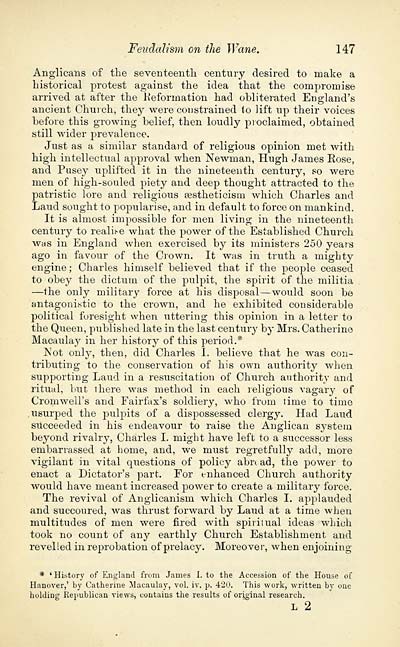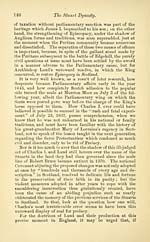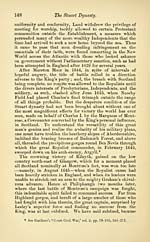Stuart dynasty
(167) Page 147
Download files
Complete book:
Individual page:
Thumbnail gallery: Grid view | List view

Feudalism on the Wane. 147
Anglicans of the seventeenth century desired to make a
historical protest against the idea that the compromise
arrived at after the Reformation had obliterated England's
ancient Church, they were constrained to lift up their voices
before this growing belief, then loudly proclaimed, obtained
still wider prevalence.
Just as a similar standard of religious opinion met with
high intellectual approval when Newman, Hugh James Rose,
and Pusey uplifted it in the nineteenth century, so were
men of high-souled piety and deep thought attracted to the
patristic lore and religious aastheticism which Charles and
Laud sought to popularise, and in default to force on mankind.
It is almost impossible for men living in the nineteenth
century to realise what the power of the Established Church
was in England when exercised by its ministers 250 yeais
ago in favour of the Crown. It was in truth a mighty
engine ; Charles himself believed that if the people ceased
to obey the dictum of the pulpit, the spirit of the militia
— the only military force at his disposal — would soon be
antagonistic to the crown, and he exhibited considerable
political foresight when uttering this opinion in a letter to
the Queen, published late in the last century by Mrs. Catherine
Macaulay in her history of this period.*
Not only, then, did Charles I. believe that he was con-
tributing to the conservation of his own authority when
supporting Laud in a resuscitation of Church authority and
ritual, but there was method in each religious vagary of
Cromwell's and Fairfax's soldiery, who from time to time
usurped the pulpits of a dispossessed clergy. Had Laud
succeeded in his endeavour to raise the Anglican system
beyond rivalry, Charles I. might have left to a successor less
embarrassed at borne, and, we must regretfully add, more
vigilant in vital questions of policy abrc ad, the power to
enact a Dictator's part. For enhanced Church authority
would have meant increased power to create a military force.
The revival of Anglicanism which Charles I. applauded
and succoured, was thrust forward by Laud at a time when
multitudes of men were fired with spiritual ideas which
took no count of any earthly Church Establishment and
revelled in reprobation of prelacy. Moreover, when enjoining
* ' History of England from James I. to the Accession of the House of
Hanover,' by Catherine Macaulay, vol. iv. p. 420. This work, written by one
holding Republican views, contains the results of original research.
L 2
Anglicans of the seventeenth century desired to make a
historical protest against the idea that the compromise
arrived at after the Reformation had obliterated England's
ancient Church, they were constrained to lift up their voices
before this growing belief, then loudly proclaimed, obtained
still wider prevalence.
Just as a similar standard of religious opinion met with
high intellectual approval when Newman, Hugh James Rose,
and Pusey uplifted it in the nineteenth century, so were
men of high-souled piety and deep thought attracted to the
patristic lore and religious aastheticism which Charles and
Laud sought to popularise, and in default to force on mankind.
It is almost impossible for men living in the nineteenth
century to realise what the power of the Established Church
was in England when exercised by its ministers 250 yeais
ago in favour of the Crown. It was in truth a mighty
engine ; Charles himself believed that if the people ceased
to obey the dictum of the pulpit, the spirit of the militia
— the only military force at his disposal — would soon be
antagonistic to the crown, and he exhibited considerable
political foresight when uttering this opinion in a letter to
the Queen, published late in the last century by Mrs. Catherine
Macaulay in her history of this period.*
Not only, then, did Charles I. believe that he was con-
tributing to the conservation of his own authority when
supporting Laud in a resuscitation of Church authority and
ritual, but there was method in each religious vagary of
Cromwell's and Fairfax's soldiery, who from time to time
usurped the pulpits of a dispossessed clergy. Had Laud
succeeded in his endeavour to raise the Anglican system
beyond rivalry, Charles I. might have left to a successor less
embarrassed at borne, and, we must regretfully add, more
vigilant in vital questions of policy abrc ad, the power to
enact a Dictator's part. For enhanced Church authority
would have meant increased power to create a military force.
The revival of Anglicanism which Charles I. applauded
and succoured, was thrust forward by Laud at a time when
multitudes of men were fired with spiritual ideas which
took no count of any earthly Church Establishment and
revelled in reprobation of prelacy. Moreover, when enjoining
* ' History of England from James I. to the Accession of the House of
Hanover,' by Catherine Macaulay, vol. iv. p. 420. This work, written by one
holding Republican views, contains the results of original research.
L 2
Set display mode to:
![]() Universal Viewer |
Universal Viewer | ![]() Mirador |
Large image | Transcription
Mirador |
Large image | Transcription
Images and transcriptions on this page, including medium image downloads, may be used under the Creative Commons Attribution 4.0 International Licence unless otherwise stated. ![]()
| Histories of Scottish families > Stuart dynasty > (167) Page 147 |
|---|
| Permanent URL | https://digital.nls.uk/94819770 |
|---|
| Description | A selection of almost 400 printed items relating to the history of Scottish families, mostly dating from the 19th and early 20th centuries. Includes memoirs, genealogies and clan histories, with a few produced by emigrant families. The earliest family history goes back to AD 916. |
|---|

